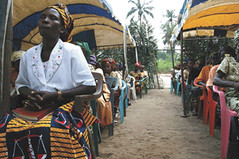(By Erik)
A Nigerian man who lived part of his life in the United States once told me that the best thing about America is all-you-can-eat restaurants.
“You couldn’t open an all-you-can-eat restaurant here,” he said, as we drove across a bumpy village road. “People would never leave.” We both laughed.
Most of us don’t keep up with the news in West Africa these days, and I’ll be the first to admit that, as I sit here looking at the treehouse and dry grass in my backyard, Nigeria seems millions of miles away.
But if you want to see the effects of what’s going on in Nigeria these days, look no farther than the nearest gas station. A number of factors are driving up the prices at the pumps. One of them is a group of rebels that is attacking oil facilities along the Niger Delta.
Nigeria is one of the world’s biggest oil exporters — the eighth largest, I think. Vast reserves of the stuff are just off the country’s coast and big oil companies including Shell are taking it. It’s not uncommon to see American oil workers in Nigerian airports, walking in and out of frequent-flyer lounges.
Nigeria also routinely is ranked as one of the world’s most corrupt countries, according to the British Broadcasting Corp. Take one look at the people who live in the Niger Delta and it’s obvious that not one dime of the country’s oil money is getting back to them. Giant potholes line the streets. People live in modest huts — and live hand-to-mouth. They take what’s called “palm fruit” and press the oil out of it, selling it for whatever they can get.
Granted, just because I live in a country that has oil reserves doesn’t mean I’m entitled to a share of the profits. But compare the standard of living in another oil rich country — Norway — to Nigeria and you see that something is off balance.
I’m not trying to portray Nigerians as impoverished or objects of pity. They are among the happiest and friendliest people I’ve met. I remember taking photos in one village while another American shot video for a promotional film. A group of youths stopped us as we were attempting to get back in our car, shouting at us loudly. I assumed they wanted money or were angry that we didn’t ask for their permission to film.
Our Nigerian host told us that they didn’t want us to leave without a gift. We followed them into the bush and watched as one of the youths climbed a tree and, using a machete, chopped off some ripe coconuts.
I got a photo of it, of course.
I don’t know much about these “oil rebels.” They kidnapped a bunch of oil workers not too long ago. A group of British journalists arranged a meeting with them, and the rebels granted the reporters an interview with one of the hostages.
Then they actually released a hostage, Macon Hawkins, to the reporters. He was in his late 60s and was diabetic. He told the reporters that he’d been treated well, and that the rebels called him “papa.” (Nigerians, like many Africans, have great respect for the elderly. “Old man” is a term of respect.)
I can’t say that this means the rebels are all noble people. Not likely. Nigeria, like many parts of Africa, has seen too much violence already. It must not become a way of life. I’m praying for peace in the Niger Delta.
Going back to that conversation about all-you-eat restaurants, I remember looking out the window of the car as it bounced along the village road and saying to my Nigerian friend, “This ain’t right. A country with this much oil shouldn’t be like this.”
I think he just nodded.
Sunday, March 12, 2006
Subscribe to:
Post Comments (Atom)



No comments:
Post a Comment